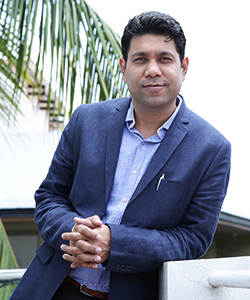Piyush Gupta began his career at Ceasefire Industries Ltd as Key Account Manager. He joined Kestone in 2005 as a fresher in the operations team and moved quickly to manage key clients for Kestone. From there on in 2007, moved to Delhi to manage the branch and then to heading the business team. When Career Launcher acquired Kestone in 2008, he became part of the management committee which was also responsible to run the organization. In 2012, Piyush took over the role of President and was given the responsibility of running the organization. The role continues, just that the scope now has expanded as Kestone has become a global organization.
Over the last decade, digital transformation played a significant role in the democratization of education. Proactive initiatives by the government on a national level to modernize education were driven by digital imperatives. This not only made education accessible to everyone, it particularly helped the large population of talented & young professionals in Tier-II & Tier-III cities to widen their career prospects. The aspiring professionals from these cities can now get access to opportunities from around the world which were earlier beyond their reach, in spite of being qualified & skilled.
The benefits of digital technologies have been realized more deeply only when the pandemic disrupted everything without any warning. Roughly over 10 Million people lost their jobs in India and the wide gap between demand & supply could only be bridged with the next phase of innovation.
Experiential virtual event technology is a major step in the direction and it emerged as one of the key tools for business continuity. The potential of this new technology has been felt across industries and exploring possibilities have become a key feature of these virtual platforms.
India has been a favourable country to support the strong start-up ecosystem and the country has a history of producing some of the successful entrepreneurs from the Tier-II & Tier-III cities. Experiential virtual platforms have actually opened new doors for them as now they can set-up their businesses without taking the burden of physical establishment and operational bottlenecks. Often termed as ‘virtual universe’, these experiential platforms can do a lot more than just engagements. With innovative technologies at our disposal, these virtual event platforms can be customized for practically anything. For a young aspirant who is planning to start his/her own retail operation or want to sell his/her products or services, these virtual platforms can be the perfect platform to set-up a virtual store. Moreover, they can build a business based on the data-driven insights that these virtual platforms provide through various in-build intuitive features.
The virtual platforms can not only boost entrepreneurship as a sustainable career option in these cities but can also help in staying relevant. The market scenario has gone through a major transformation in the last year. With remote work in place along with increased consumption and dissemination of digital data, these virtual event platforms are ideal to tap into the market. Increased attention span and time spent on mobile can also be leveraged by the aspiring entrepreneurs from Tier-II and Tier-III cities to build a career.
As far as job prospects are concerned, these virtual platforms have already hosted some really successful career fairs and these benefited a lot of job seekers from these cities since they could connect with companies remotely, without undertaking the risk of travelling. Most of the job fairs hosted virtually on these experiential virtual platforms saw active attendance and it has actually become the new normal to explore career prospects.
These virtual experiential platforms are also offering greater value in comparison to job portals. The job portals are no longer ideal since it has become algorithm-based, so getting noticed to the recruiters is a challenge. It is even more challenging for the young Indian professionals and aspirants from the Tier-II & Tier-III cities to connect. Virtual platforms seem to have solved this problem as the professionals can interact and network in real-time and can also drive insights to form the interactions. This makes interaction seamless and effective as compared to the portals where communication is one-way most of the time.
Now a lot of people confuse experiential Virtual platforms with web-conferencing apps. But there are clear differences between the two. In the first place, web-conferencing apps are designed for interaction with smaller groups and is ideal for hosting workshops, training sessions or internal meetings. In a typical web conferencing environment, there is usually one key presenter who interacts via webcam on a specific topic and on the other side there are attendees or respondents who interact by posting questions and queries during or after the session is over. In a more general term, a web-conferencing app is a simple app-based interface.
Whereas, virtual platforms are more extensive and inclusive. In simple terms, it is an extension or replica of a big format engagement but with more flexibility and options. In a digital-first environment, virtual platforms make it easy to engage with a larger audience through seamless social media integration and this works effectively when it comes to further one’s career or find suitable opportunities.
Experiential virtual event platforms are AI-enabled and come with intuitive attendee management tools. But in web conferencing apps this feature is missing. While hosting a virtual event, brands can have the flexibility to measure their event performance real-time which in turn can generate insights on the overall ROI. While in webinars the results and feedbacks are somewhat instant, virtual event platforms can be leveraged as an effective lead generation tool.
Apart from these, a virtual platform comes with various formats as opposed to unchangeable webinar spaces, thus giving audiences absolute flexibility on how and where they want to consume the experiences.
As far as the accessibility and scalability are concerned, virtual platforms are designed to be highly user friendly. With a simple sign-up, one can get access to a platform and the experience is extremely fluid. The platforms are equipped with robust security features since they deal with a lot of useful data. The experiential virtual platforms are also highly scalable and it can be a great tool for professionals from the Tier-II and Tier-II cities and browse through infinite possibilities.
More About Piyush Gupta

‘Piyush (as he’s known in Kestone) is a man on a mission in a hurry, right now. He strongly believes that the worlds of marketing, branding, and communication are in the midst of a seismic shift. And that Kestone has once in a lifetime opportunity to pivot itself to ride the new normal successfully. The new experiential, virtual platform that his team has developed with him actively involved at every step, he avers, is the secret ace in his sleeve, to achieve that. He is excited by the limitless possibilities that the new platform brings and has made it the single biggest focus for him and Kestone this year.
A graduate of 2002 from Jadavpur University, Piyush went on to pursue his MBA in Marketing from ICFAI Business School, Bengaluru. A foodie by heart, he is a big sports enthusiast (not just cricket). One of his favourite past times is watching inspirational documentaries/movies besides reading autobiographies and books on people who transformed their industries/organizations.




